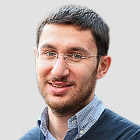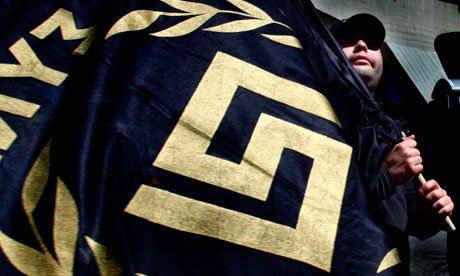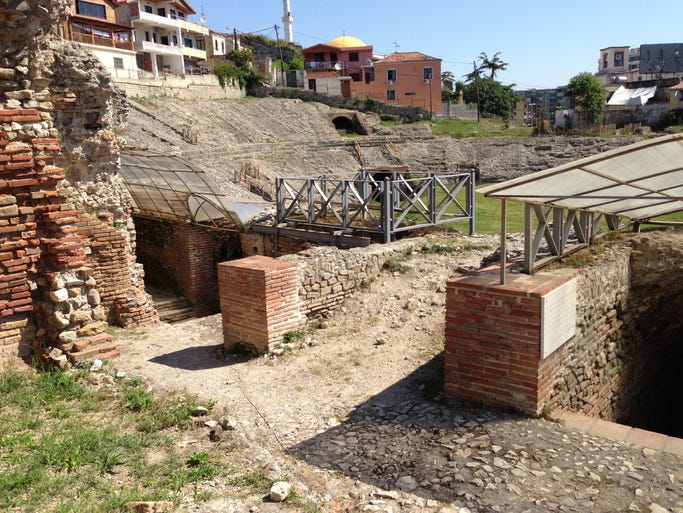A cheap vacation in the Riviera? Try Albania
David A. Andelman, Special for USA TODAY
11:33 p.m. EDT September 19, 2013
SHARE
68
CONNECTEMAILMORE
SARANDA, Albania --
Nestled
in the remote eastern corner of the Adriatic, where it joins the Ionian
Sea, is a 125-mile stretch of beachfront real estate unlike most others
in the world. This little-known edge of Europe is called the Albanian
Riviera. It differs sharply from its counterparts, the French and
Italian Rivieras, by its cost — a week there could give you barely a few
hours in its snazzier, snootier namesakes.
Certainly there
are other vacation beach fronts along the brilliant blue waters of the
Adriatic: the increasingly popular Dalmatian Coast of Croatia, for
example. But few visitors uncover the beauty and simplicity of Albania,
which at one time was Europe's most thuggish communist gulag but is now
America's most slavishly devoted ally on the continent.
While the
Albanian seaside scenery is quite extraordinary, above all the area is
cheap — easily one-tenth the cost of its French and Italian counterparts
and half the cost of the Croatian coast.
ALSO ONLINE: Is Europe's most affordable capital worth the trip?
Seafood,
caught that very morning, is served at beachfront cafes and grilled to
perfection before your eyes for less than $8 per person. Fresh fruits
and vegetables, grown in roadside fields, are for sale at stands for
pennies. In the hills behind the charming little coastal villages are
towns that date back to Greek and Roman times.
My wife,
Pamela, and I begin our trip from the north in the capital, Tirana, an
hour's drive east of Durrës and work our way down the coast. Durrës is
effectively Albania's Marseilles, a thriving commercial
container-seaport. Boats have been landing here since at least the
seventh century BC. The Roman imprint is still visible in a
mini-coliseum built to entertain those ancient colonizers. The
Amfiteatri, at barely a third the size of Rome's Coliseum, is a
pocket-sized replica uncovered only in 1966. Today, modern apartments
surround it.
Pamela rushes down into the grottoes, with me
in tow, arriving in a series of "green rooms" for the Roman gladiators,
who could see through tiny slit windows up into the arena where they'd
shortly emerge before 15,000 cheering, bloodthirsty fans. It's a
chilling experience in more ways than one, and a relief from the
80-degree heat above ground.
Once we pull out of town headed
south, we get our first real taste of the coast and its beachfront. Much
like Nice or some other Riviera towns, there are stretches where new
apartments face the sea (and go for less than $100,000). They're lined
with sand-and-pebble beaches.
To the left, we spot the first of
thousands of small domed, concrete pillboxes set into the hills.
They're among the few visible legacies of Enver Hoxha, the paranoid
communist dictator, who'd counted on them to repel invasions from the
sea that he saw as imminent. Other similar legacies remain. Embedded in
the rocky hills lining the tiny inlet of Porto Palermo halfway down the
coast are two deep tunnels — safe havens for the Albanian submarine
fleet.
We make nightfall at the town of Vlora, mid-point of
the coast and check into the Hotel Vlora International. Although its
balconies overlook the Adriatic, right in front of it we spy a newly
renovated vest-pocket jewel, the Bologna (for a third the price), which
is just accepting its first guests and from whose terrace we can step
right onto the seashore. So that night, we dine at the Bologna's seaside
café. We leave our choice of dishes — whatever has been caught that
afternoon — to the young English-speaking waiter, one of scores of
college students eager to try out the language on "real" Americans.
We're not disappointed. As we watch two old men reel in their dinner
from the beach in front of us, dish after dish appears — thinly sliced
carpaccio of octopus marinated in native olive oil, a huge steaming bowl
of fresh mussels and a platter of whole grilled redfish that we easily
fillet.
Seafood is certainly the food of choice, and the
next day, as we work our way down the coast toward the Riviera's
southern anchor at Saranda, we fly past tiny seafront cafes interspersed
with beaches lined with chaise lounges and colorful beach umbrellas —
all largely empty in the early summer days. We're eager to reach
Saranda since a half hour outside of town is the UNESCO World Heritage
site of Butrint, whose impeccably preserved or restored remains span
more than 2,500 years. Past the row of olive trees and a 16th-century
watch tower, built by the Venetians, who then ruled the Adriatic, to
ward off Ottoman attacks, we stumble into a 3rd-century B.C. Greek
theater. The town spirals outward from there as it changed hands to the
Romans, who built bathhouses and villas four centuries later. We stand
at what would have been the theater's center stage, my actress wife
gazing up in awe at what might have been an appreciative audience.
That
afternoon, back in Saranda, we stumble on another ancient site —
Mosaica, a 5th-century synagogue complex that was once the center of a
thriving Jewish community, including a Yeshiva. From there, it's a short
stroll down to the palm tree-dotted concrete boardwalk that winds along
the beachfront, lined with yellow awnings and delightful cafes.
We
return to Tirana through the mountainous interior, stopping off in
Gjirokastra, another UNESCO World Heritage site whose striking stone
homes date back 200 years. We begin with the hilltop citadel. As we poke
our heads into ancient stone prison cells, used most recently by
Hoxha's communist secret police, we stumble upon an American woman of
Albanian origin, whose father himself had been imprisoned here for
nearly four decades for being a threat to the state. Together we stroll
through the castle, emerging finally on a small grassy knoll where the
hulk of a World War II-vintage American jet trainer is resting. An
American spy plane brought down by the Albanian air force was the story
at the time. The truth is more mundane: it developed engine trouble, was
forced to land at a nearby airfield, was then seized and the pilot
quickly released.
Heading "home," we encounter some truly
challenging roads in the process of being rebuilt or desperately needing
work. So there are two choices for visitors. Wait just a few years
until it's smooth-sailing from end-to-end with prices to match. Or
visit now when there are still gems to be uncovered for a song.
If you go
Getting there:
You can fly into the capital, Tirana, and rent a car (there are trains
and buses but they are painfully slow). Avis, Hertz and Eurocar all
operate there. You can also fly into the Greek island of Corfu and take a
hydrofoil ferry to Saranda (a 30-minute trip) which, depending on the
time of year, ranges from $25 to $40 each way. There are also
ferries
that take both cars and passengers from Brindisi, Italy, to Vlora,
though round-trip by car costs more than $400, compared with barely $100
for a passenger, so you're better off renting the car on the Albanian
side.
Most of the coastal towns are sufficiently compact that you
can easily walk from end to end, but taxis are also available and a trip
from town down the coast to a seaside bistro is less than $10. Make
sure you have small bills since few can change large denominations.
Where to stay:
If you are staying for a week or more, you may want to make your base
in one of the hundreds of apartments that face the Adriatic. Companies
like
Rent Holiday Homes
have apartments ranging from $30 a day to $900 a week depending on the
size and the season, with discounts as high as 25% for multiple weeks in
low season. For hotels, try the
Vlora International
where a double with an ocean view ranges from $80 to $120. The smaller,
recently renovated Hotel Bologna is half the price. For a real bargain,
try the
Hotel Paradise Beach,
10 miles south of Vlora, for for $27 to $55 a night. Nearby, at the
Sunny Beach Hotel, a family room with fridge that sleeps four is $80 in
high season ($20 in off season) per day, or $33 a day when booked by the
month. It's difficult to book in an advance for any but the top hotels,
since many don't have a website. But all are family-run and if they
can't accommodate you, they will lean over backwards to find you a
congenial spot nearby. In Saranda, the
Hotel Butrinti,
at $90 to $120 a night, is just across the road from a beach and some
lovely beachside cafes. It's within easy walking distance of the town
center and has a magnificent view across the bay to Corfu from the
balconies in most of its rooms, which are small.
Where to eat:
Just about any place along a beach has fresh-caught fish and shellfish.
For the most part, stay away from the hotel dining rooms which are
expensive with spotty service. The exception is the wonderful beachfront
café of the Hotel Bologna in Vlora where fresh seafood is the order of
the day. About 12 miles down the coast road from Vlora is the Ibiza
restaurant where a meal of squid, octopus, clams, mussels and fresh
tomatoes followed with homemade cinnamon ice cream with fresh
strawberries costs about $25 for three. Atop a hill overlooking Saranda
and its harbor is the 16th-century Castle of Lëkurësi with a marvelous
bar/restaurant, where during the high season service is out on the
spacious terrace overlooking the countryside and the Adriatic far below.
There you can feast on seafood and grilled meat for $10-$15 a person.
The Italian influence in the region is quite clear and there are pizza
joints up and down the coast. Choose one on the beach overlooking a
beautiful view of the Adriatic, like the Pizzeria Limani in front of the
Butrinti Hotel. Thin crust with fresh toppings goes for less than $10
for an enormous pie that serves two or three healthy appetites.
For more information:albaniantourism.com
David A. Andelman a former New York Times and CBS News correspondent, is the editor in chief of World Policy Journal
and author of A Shattered Peace: Versailles 1919 and the Price We Pay Today.

















